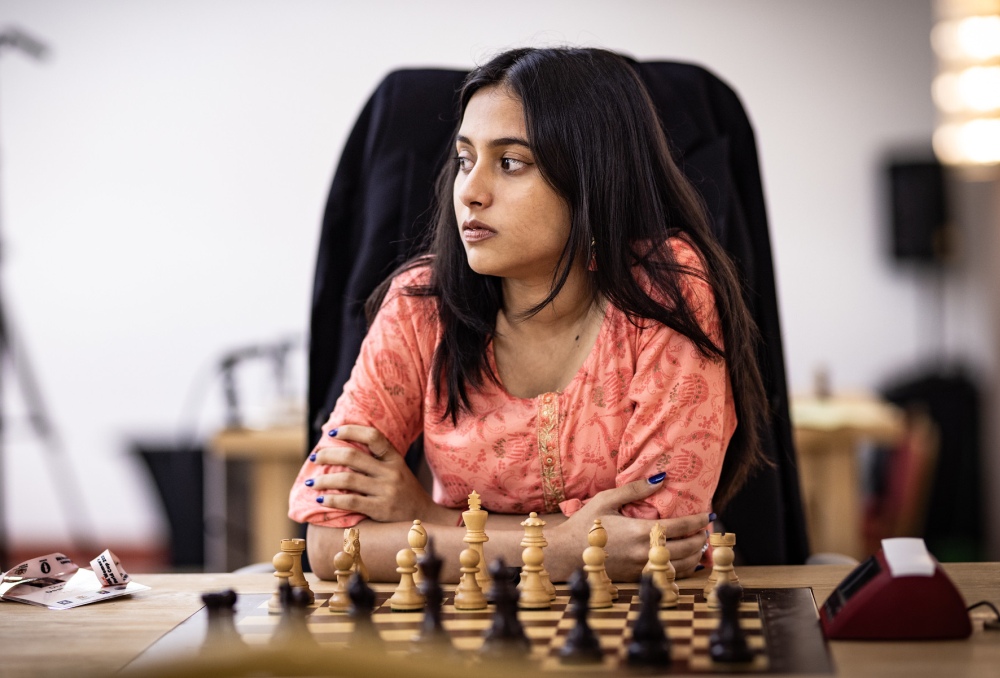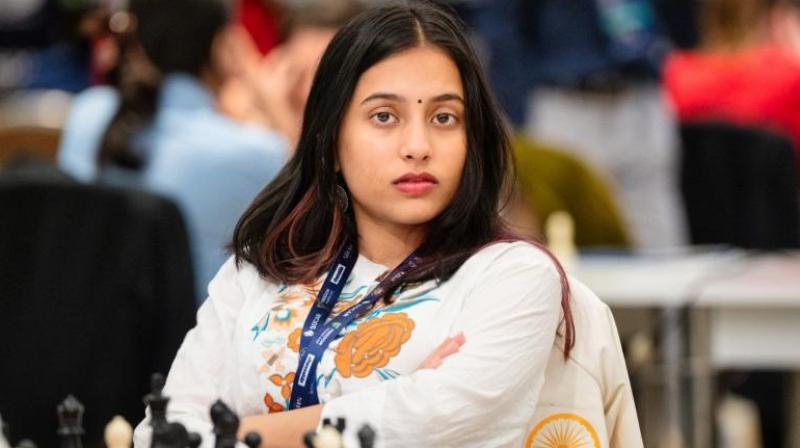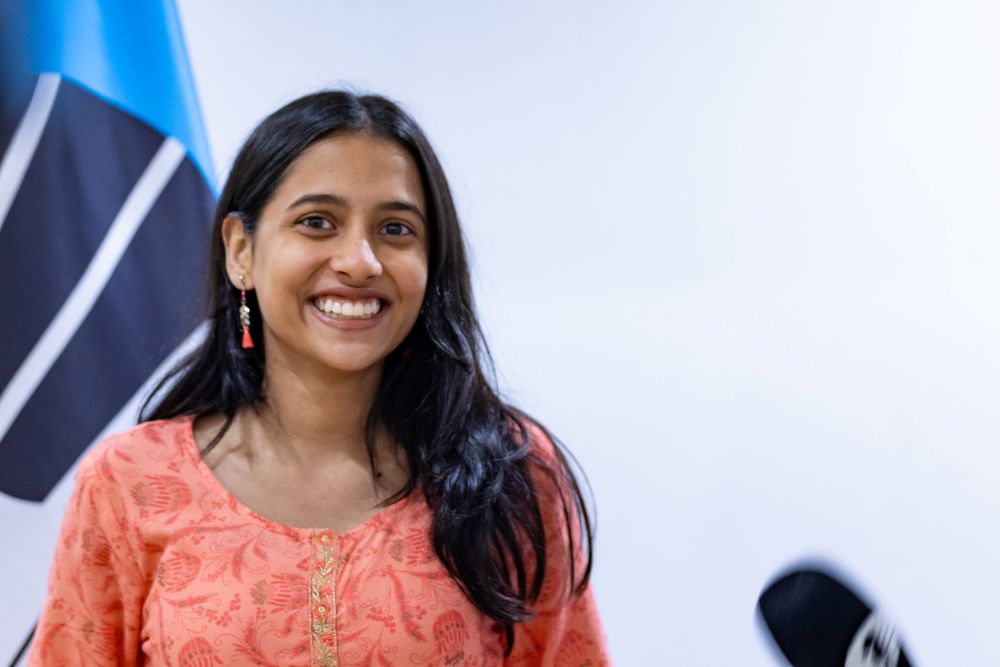In a remarkable turn of events at one of the world’s most prestigious women’s chess tournaments, 19-year-old Indian Grandmaster Divya Deshmukh has advanced to the semifinals of the FIDE Women’s World Cup. Displaying fearlessness, focus, and flair, Divya took down higher-rated international opponents with sharp, tactical brilliance and steely composure across classical and rapid formats. Her win has become a significant moment in India’s sporting history, representing a powerful statement on behalf of young Indian talent in a traditionally European-dominated chess landscape.
Divya’s progress to the semifinals is not only a personal triumph but also a symbolic victory for Indian women in intellectual sports, who are now commanding global recognition. As her achievement reverberates across the chess community, India celebrates the emergence of another future giant in the making—one who may soon take her place among the greats of the game.

1. Meteoric Rise to the Semifinals
Divya’s journey to the semifinals has been anything but ordinary. Starting from the early knockout rounds, she demonstrated poise and calculation that belied her young age. Facing increasingly stronger opponents in every round, she showed remarkable resilience in pressured situations—especially in rapid and tie-break games where even the smallest error can turn into elimination.
Her adaptability across time controls and her excellent preparation against specific counters allowed her to consistently edge past seasoned veterans. Her quarterfinal win came through a combination of disciplined endgames, tactical middle-game skirmishes, and the ability to stay calm even in tight positions. With every victory, her confidence—and fan base—has continued to grow.
Economically and socially, Divya’s ascent has inspired renewed investments in chess infrastructure in India. Local governments, private academies, and corporate sponsors are increasingly backing chess programs with scholarships, better training facilities, and international exposure opportunities. This ecosystem development ensures continuity, creating a sustainable pipeline of talent and enabling more young girls and boys from diverse backgrounds to pursue chess professionally. The excitement following her semifinal appearance propels this momentum, making chess a more attractive career choice.
Finally, as the semifinals approach, the anticipation surrounding Divya’s performance has become electric. Analysts predict this stage will be a true test of her readiness to compete among the global elite consistently. The lessons learned here will likely shape her approach for years to come, helping her sharpen strategic aspects and psychological readiness further. Regardless of the ultimate outcome, Divya’s journey so far has already broadened the horizon for Indian chess, proving once again that talent combined with determination can challenge and reshape global narratives.
2. Building Block Years: From National Champion to Global Contender
Divya’s journey to the top levels of chess has been guided by patience and perseverance over the last several years. Starting her chess career at a very young age, she dominated national age-group competitions and quickly transitioned into the senior women’s category. It wasn’t long before she became a national champion, gaining recognition across India for her natural aptitude and consistent tournament performances.
By the age of 17, she had already accumulated significant experience, having represented India in team events and having achieved the Grandmaster norm in record time. Her transformation from a junior prodigy into a fully mature competitor on the world stage is the result of years of hard work, precise coaching, and a deep intrinsic understanding of the game.
3. Defining Matches: Displays of Tactical Superiority
Every successful chess tournament has defining moments, and in Divya’s case, these were games where she overturned positions that seemed difficult or even unwinnable. In the earlier rounds, she surprised several higher-ranked opponents with aggressive pawn sacrifices and unconventional openings, instantly taking them out of their comfort zones.
Her mastery in handling complicated positions under severe time pressure has won admiration. In multiple rounds, she fought back from suboptimal middlegame structures and gradually wore down her opponents with superior endgame technique. Whether it was creating passed pawns on opposite wings or trapping opponents in zugzwang patterns, her creative brilliance was on full display.

4. Playing Style: Bold, Resourceful, and Intellectually Elegant
Divya’s playing style is strikingly modern. She is known for her fearless decision-making and isn’t afraid to surprise with sharp lines, enter difficult positions, or take material imbalances for long-term strategic benefits. Her preparation includes classic positional themes but with a flexible mindset that allows her to improvise when needed.
A notable part of her approach is her ability to manage psychological pressure. She keeps a neutral table expression, calculates deeply, and constantly challenges traditional lines with fresh ideas. Despite her youth, she carries herself with the maturity and confidence of a seasoned competitor—qualities that make her a genuine threat to the world’s best.
5. Backbone of Support: Training, Family, and Community
Behind every great athlete is a system of stability and encouragement, and Divya is no exception. Her family has been a key pillar in her rise, balancing her academic commitments with intense tournament schedules. Her coaches played an essential role in developing her tactical sharpness, time management skills, and advanced decision-making techniques.
Additionally, chess communities and academies across India have nurtured her progress through structured training, exposure to online blitz platforms, and access to international-level sparring partners. Her engagements with rising young talents across India have also kept her grounded and motivated, while national chess organizations continue to support her participation in elite global competitions.
6. Impact on Indian Chess and Gender Representation
Divya’s breakout performance is not just a sporting achievement—it signifies a broader cultural shift. In a country where elite sports have often been male-dominated, her success in a cerebral, global sport like chess reinforces that girls and young women can not only compete—but win—at the highest level.
Her rise joins the trend of growing female representation in Indian chess, alongside a new generation of women players who now travel globally, secure sponsorships, and dominate in events previously seen as out of reach. Her performance also helps reposition chess in India as a gender-inclusive sport where talent, not tradition, shapes the future.
7. Next Challenge: The Semifinals and Beyond
Now just two wins away from the championship title, Divya has her eyes set on higher goals. The semifinal promises to be immensely challenging, as she will face one of the top seeds or an established top-ten opponent. Nonetheless, her preparation, match stamina, and confidence gained from her recent victories position her as a strong contender to reach the finals.
Success in the tournament could not only earn her a place in the upcoming Women’s Candidates Tournament but significantly boost her international rating, sponsorship value, and career trajectory. A World Cup title would place her name in the elite pantheon of women’s chess, but even reaching this far at such a young age has already written her into global chess history.

Conclusion: A Star on the Rise, A Country Inspired
Divya Deshmukh’s advancement to the semifinals of the FIDE Women’s World Cup is more than a personal milestone. It is a landmark moment for Indian chess and for women in Indian sport. Her rapid ascent, impressive skill set, and quiet confidence symbolize the rise of a new era: one where India no longer just celebrates past legends but actively produces new ones.
With young chess players watching and aspiring to emulate her journey, Divya is more than just a player—she’s a symbol. A symbol of possibility, progress, and potential. As she readies herself for the battles ahead, India will continue cheering, watching, and believing—in her, and in the unstoppable rise of Indian chess.
Divya’s psychological resilience has been one of the standout qualities throughout the tournament. Chess at this level is as much a mental battle as it is a game of strategy and tactics. Maintaining focus for hours under the glaring pressure of knockout rounds requires extraordinary discipline. Divya’s calm demeanor during critical moments—particularly in blitz tie-break games—has been instrumental in helping her stay composed and capitalize on small errors made by her opponents. This mental fortitude is often cited by her coaches as one of her greatest assets and a key differentiator from even highly skilled peers.
Her deep opening repertoire, carefully tailored to counter specific opponents, has shown impressive versatility. Unlike players who rely heavily on a narrow set of openings, Divya varies her choices between classical systems and modern, dynamic lines that keep her adversaries on their toes. Her ability to shift gears mid-game, switching from an aggressive attack to a patient positional grind, demonstrates an advanced understanding of chess psychology and board mechanics. This adaptability has surprised many seasoned grandmasters and has been pivotal in securing many closely contested wins.
The support structure around Divya is an essential aspect of her continued success. Her coaches, many of whom are familiar with the rigors of international chess circuit life, play a strategic role beyond just game preparation. They help manage her tournament schedules, conduct post-game analyses, and provide psychological support, ensuring she remains balanced both on and off the board. Her family’s encouragement and sacrifices have also created an environment where she can focus fully on honing her craft. This synergy between personal and professional support forms the invisible backbone of her achievements.
This tournament has spotlighted the increasing globalization of chess talent, with players like Divya challenging traditional power centers. Historically dominated by Russian, Chinese, and European women grandmasters, the world stage is now witnessing a more diverse pool of contenders, with India spearheading much of this wave from South Asia. Divya’s success, along with that of her compatriots, is creating a ripple effect that is promoting not just competitive chess but also cultural exchange and mutual respect among emerging chess nations.
Follow: Divya Deshmukh

